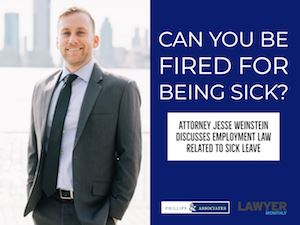
Jesse Weinstein, an employment discrimination attorney at Phillips & Associates, recently spoke with Lawyer Monthly magazine regarding the issue of whether an employee can be fired for being sick. Phillips & Associates is a law firm representing plaintiffs in discrimination lawsuits in New York, New Jersey, and Pennsylvania. Our skilled New York City employment lawyers are proficient in helping victims of discrimination seek compensation for their losses.
Mr. Weinstein noted that New York, like most states, is an at-will employment state, which means that an employee can be terminated for any reason, as long as the reason is legal. Sickness typically qualifies as a legitimate reason to fire an employee. As explained by Mr. Weinstein, however, discrimination may arise when a “sickness” constitutes a disability.
Definition of a Disability
The definition of a disability differs under state and federal laws. Specifically, as Mr. Weinstein explained, under federal law, a disability is defined as a mental or physical impairment that significantly impairs one or more major life activities. The definition of a disability under New York law is much broader, and it includes any mental, physical, or medical impairment that prevents the exercise of a normal bodily function. Thus, under New York state law, an employee does not need to show that his or her disability impairs a major life activity. Furthermore, as Mr. Weinstein noted, New York City provides even greater protections to employees, defining a disability as any actual or perceived mental, medical, physical, or psychological impairment. If an employee is designated as disabled under local, state, or federal law, an employer can face legal action for firing the employee.
When Terminating a Sick Employee is Wrongful
Mr. Weinstein cautioned, however, that an employer can only be held liable for firing a sick employee if the employee’s sickness constitutes a disability. Disabled employees are protected from being fired due to their disability by the Americans with Disabilities Act (ADA) and the Family and Medical Leave Act (FMLA), both of which are federal laws. Additionally, the New York State Human Rights Law and the New York City Human Rights Law provide protections for disabled employees in New York State and New York City, respectively.
Furthermore, under federal law, if a disabled employee does not receive an accommodation, the employer is required to prove that providing an accommodation would cause an undue hardship for the company’s operations. State and local laws also require employers to engage in cooperative discussions with employees seeking accommodations. Thus, as Mr. Weinstein explained, if an employer fires a disabled employee without providing an accommodation to the employee or thoroughly discussing a request for an accommodation, this may constitute a wrongful termination.
Employer Obligations to Sick Employees
As explained by Mr. Weinstein, under the FMLA, eligible employees are permitted to take up to 12 weeks of unpaid, protected sick leave. Employees are only granted leave under the FMLA for serious medical conditions, however, such as cancer, diabetes, and mental illnesses. Generally, the FMLA obligates an employer to hold the employee's position open throughout the duration of the leave and prohibits employers from firing employees solely for taking FMLA leave.
The protections provided to sick employees at state and local levels depend on where the employee works. For example, as Mr. Weinstein stated, New York City employers who have at least five employees who work more than 80 hours in a year must provide paid sick leave to their employees. Employers with less than five employees who work more than 80 hours in a year, however, are only required to provide unpaid sick leave. Some states, such as Pennsylvania, do not require employers to provide any sick leave.
Damages Recoverable in a Disability Discrimination Case
There are several elements that come into play when a jury assesses a plaintiff’s damages in a disability discrimination case, such as the length of time during which the employee was out of work following the termination, whether the employee was promised any bonuses before he or she was terminated, and the emotional and psychological impact of the termination.
Consult a Skilled Disability Discrimination Attorney
Employees are protected under the law from discrimination in the workplace, and employers that violate anti-discrimination laws should be held accountable for any harm that they cause. Mr. Weinstein and the attorneys at Phillips & Associates are dedicated to assisting employees harmed by workplace discrimination. If you believe that your employer engaged in discriminatory practices, and you suffered damages as a result, you should contact Phillips & Associates through our online form or at (866) 229-9441 to set up a confidential and free consultation to discuss your case. We represent employees in disability discrimination lawsuits in New York City, as well as in Westchester, Nassau, and Suffolk Counties and in New Jersey and Pennsylvania.
